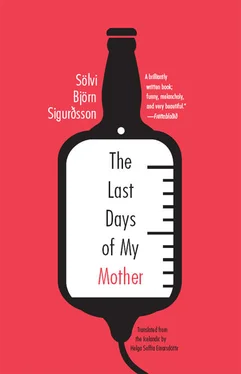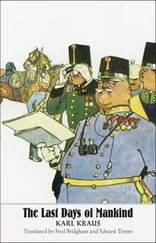“We need to start taking measures,” the doctor said. “Nothing but the equalizer will do from now on.”
He handed me an IV bag with a long tube to attach to a catheter. People couldn’t handle the drip for long, he said, the side effects would start kicking in after a couple of weeks, but for a short while it was a wonder drug. Frederik had developed the concoction after decades of research, calculating the right value of the phenethylamines in proportion to the opiates.
“And people seem to hang on to their personality pretty well,” he said. “Thanks to those like Tim Wallace; there would be no equalizer without them. Some professionals insist that it disorients that patient, but that’s not my experience. Your mother is in severe pain and it’s only going to get worse. When the sarcoma gains the upper hand it tends to be more painful than other forms of cancer. We’ll need to play it by ear. It’s just a question of time now.”
“I’ll see if I can’t convince her,” I said. “I won’t run away again, Frederik. Promise.”
“Good. Good.”
We said good-bye and I headed back to Highland, past a crowd of people with loudspeakers and signs. Arthur van Österich was going to die tonight and there were some protests to be expected. Most of the commotion was thought to be around Lowland so the grounds had been closed off. Dozens of people stood out by the road shouting slogans, life above all, no one shall decide another person’s death.
“I understand it’s like this around all the hospices in the country,” Helena said when I met her in the lobby. “These people actually make the special trip up here to cause a racket, as if there isn’t enough shit going on to scream about. We go to war, spend our tax money on warfare, the oldest pact in the world that it’s okay to take a human life when that’s the way the wind blows. And still those bastards show up here and shout at us as if we’re criminals.” This was not the first time I’d heard her rant about the opponents of euthanasia, and she hadn’t finished: “People think it’s fine to watch others disintegrate. They don’t do anything about people dying like dogs in the street. But if those same people decide to throw themselves off a bridge they’re accused of taking into their hands a power that’s not theirs. People don’t stand out there in the cold protesting because they care, but because we take away their illusions. We take away the optimism and abundance by acknowledging death.”
“Maybe some people just have stronger beliefs than others,” I said, not understanding why I felt the need to defend them.
“I think you’re just saying that because you’re scared now. I sometimes think the same way, that maybe Duncan will live long enough to survive this, if he decides not to take his own life. That he could die in slow motion so I can lie to myself, tell myself that death is not horrible, that it is something completely different, but I know that he’s had enough. People don’t think about that when they show up here with their signs. Their opposition doesn’t come from compassion, but out of rage. They think those who commit suicide are committing a crime against everyone they leave behind, but then they don’t care about people dying because of poverty. People don’t care about the next guy as long as he doesn’t kill himself.”
I wanted to agree with her, give some philosophical input on our situation, this world that championed the freedom of the individual to such an extent that he could ruin a whole nation by photocopying documents, but then object to Mother getting help in dying. However, I had not grown up with this idea like Helena had. She saw that and asked me to excuse her lecturing, she just couldn’t contain her indignation sometimes.
“No worries,” I said. “I understand you too. People sometimes think it’s easier to correct other people’s lives instead of their own.”
“Which is why they go into psychology,” she replied. “Or take short cuts by shouting and waving signs. But in the end we all have to face ourselves.”
“I suppose so. I think it’s best that I go see what she wants to do about the drip.”
I walked into the room and sat on the bed. It didn’t take much to convince Mother to agree to the equalizer. Each drip counted down the days we had left. The mornings imported sense to remember all our victories in Amsterdam in the beginning of summer, when all days were special drinks and delight. That was life, that was the memory. We moved furniture around to make better use of the living room and made Highland a theatrical stage for the past. Ramji got movers to bring in a hospital bed on wheels. I got out the photographs we’d taken with us from home, scanned them into the computer and held slideshows in the dining room. Duncan slept a lot; Mother and I were mostly alone with the hundreds of photos, each telling a story. Reykjavik. Berlin. Montparnasse. When Willy Nellyson lit up the wall she said: “He had his good points, your dad.” The balcony of Hotel Europa got a more enthusiastic reaction. The Amstel river and everything we’d done: Trooper in de Dam in Rembrandtplein, Trooper sleepy after the single glass of wine.
“Lord, we’ve had fun,” she said, flipping through a series of cousin Matti having a banana smoothie that was so well documented it looked like a moving picture. “Do you remember, Trooper? When all days were drinking days, and the weekends too?”
I could recall being confined to the attic with a pound of chocolate and E.T . on full blast to drown the revelry downstairs.
“There was singing and laughing back then. Do you remember Brownie? Completely bonkers, but the funniest person I’ve ever met. She passed out on our Moscow trip and never woke up again. But she lived while she lived.”
I was transported back in time and was once again hit hard by the inevitability of the end. Each passing moment is the last, each day goes by for the last time. And the days were becoming fewer. The moment had come for her to decide how she wanted to die. Did she want to breathe in nitrogen? Helium or argon? Or did she want to drink barbital, which was what Arthur van Österich chose to do in the end? His death was described as peaceful and painless in all of the major papers. I cut out his last statement from one of them and translated for Mother:
Nothing can prepare you for the fear that grips you at death’s door. My life’s work has been to convince people to have the courage to accept their fate without fear or falsehood. I’ve maintained that with the right preparations each and everyone can choose their final hour and live it without faltering, close their eyes for the last time without regret. These past few days I’ve been both restless and scared. I judge no one for their choice of path, whatever it is and whatever it entails, as long as it causes no harm to others. Respectfully yours, Arthur van Österich .
The fear set on Mother like a storm from within her bones. After a couple of days on the equalizer the world became such a pleasure dome that it was inconceivable that the darkness would ever return. Free of the constant invasions of the physical world, the Sphinx in her rose again and she became more prophetic than any tarot card, righteous, lucid, undaunted, noble and celestial in spirit, as if the pillars of the earth had merged with her feet. With faith in this equanimity she pulled out the drip and was almost instantly overcome with blinding angst. In the half hour this hurricane swept over her she hated death more than all the disappointments life had brought her. She felt it in the pain that ripped her humanity away, turning her into a reptile and a harpy, and yet she would not let go, didn’t want to die. No matter how death tried to seduce her with promises of rest, peace, eternal sleep in the embrace of the stars where her light shone on the world and the sky is the reflection of Eva Briem, she would not go. Anything was better than to disappear and become nothing but this deafening, terrible silence, this gaping void around a body that is doomed to rot, become a skeleton, dirt, and dust. The ache dug into her marrow and rammed a hot poker into her spine for the eleven thousand hours that half hour without the equalizer seemed to last. To live and then suddenly no longer exist: this journey from one level of existence to another brought a crazed dimension of fear. The reverse side of sixty years of experience flickered on in a second, but what did it contain?
Читать дальше












